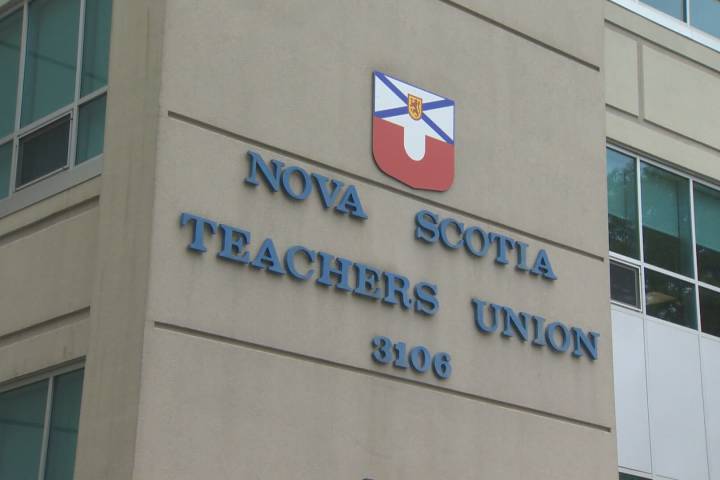Armed with the Department of Education’s plan to tackle at home learning Nova Scotia teachers are optimistic about finishing out the school year but aren’t downplaying the challenge that lays ahead.

Paul Wozney, the president of the Nova Scotia Teachers Union, said they felt encouraged by a number of guidelines in the plans; such as mail-out learning packages for those without internet access, sectioning of the lower, middle and upper grades and creating separate plans for each, and including much-needed support for graduating students.
“The biggest section actually applies to graduating students,” he said. “So that’s front of mind you can see that in the plan.”
READ MORE: N.S. premier calls out April Fool’s Day prankster
Wozney indicated that the goal of teachers, in relation to students poised to finish high school this June, has been to provide a numeric grade “wherever possible” so as to minimize any effects on transcripts required for university admittance.
If that’s not feasible however there’s an option to issue a pass/fail grade.
Having heard concerns from parents whose children were just a few months shy of graduation before schools were closed, Wozney says it’s likely university admissions will be taking the developing nature of the COVID-19 pandemic into account for the coming school year.
“I understand Grade 12 parents and students especially are worried about what this could mean for university admissions,” he said. “But by all accounts, universities are aware of what we’re dealing with in terms of being able to work with students.”
“I would be shocked if they don’t make some adjustments for admissions processes recognizing the unprecedented situation that we’re in.”

Wozney says successfully navigating this unprecedented environment is contingent on everyone involved in a given student’s education coming together and working collaboratively.
“We have no road map for what we’re dealing with,” said Wozney.

Get weekly health news
“We’re going to have to do that as a team both teachers working with principals and other people in the school setting but also students and parents,” he explained. “We need to be a community in the truest sense of the word, we need to look out for one another, we need to respect and empathize with one another and recognize that everyone is struggling under this circumstance but we’re doing the best we can.”
This week Premier Stephen McNeil extended the school closure period to May 1.
READ MORE: Nova Scotia schools to be closed until May 1
While Wozney says at this point there’s no indication that classes will be extended into the summer months he says teachers are preparing for what’s on the immediate horizon, rather than changes that may or may not come later.
“We’re going to do what we can do up until April 30 under the framework that’s been provided and if we need to do it longer than that then we’ll find a way to do that too,” he explained. “I really think it’s important we don’t muddy the waters about what’s in front of us right now with what might be down the road.”
Kerri Veinot is a Grade 2 teacher at Grosvenor Wentworth Park Elementary School.
She expects challenges will arise as they begin teaching at a distance but says using technology is nothing new to our youth.
“Kids are adaptive and teachers are adaptive,” she explained.
“My kids are already familiar with technology, we use it in the classroom already,” she said. “So it’ll just sort of be taking another step and teaching them to use it in another way.”
Veinot says she’s been in contact with many of the families of her young students and while she’s yet to have anyone express major concerns, teachers are committed to ensuring parents feel comfortable and supported.
“We certainly don’t want parents to be overwhelmed by any of it and we’ll keep in contact to make sure that’s not happening,” Veinot explained.
Ever since students have been out of schools Veinot says across the board teachers have banded together to collaborate on how to ensure students will still receive a quality education despite the temporary disruption, sharing resources and ideas on how to make at-home-learning a success.
Another thing that teachers have in common she says is that they’ve been eager to get back to what they love doing; helping students succeed at school.
“Everybody is really excited to connect with their kids again and get started,” she said. “It’s hard to be away from them.”
Questions about COVID-19? Here are some things you need to know:
Health officials caution against all international travel. Returning travellers are legally obligated to self-isolate for 14 days, beginning March 26, in case they develop symptoms and to prevent spreading the virus to others. Some provinces and territories have also implemented additional recommendations or enforcement measures to ensure those returning to the area self-isolate.
Symptoms can include fever, cough and difficulty breathing — very similar to a cold or flu. Some people can develop a more severe illness. People most at risk of this include older adults and people with severe chronic medical conditions like heart, lung or kidney disease. If you develop symptoms, contact public health authorities.
To prevent the virus from spreading, experts recommend frequent handwashing and coughing into your sleeve. They also recommend minimizing contact with others, staying home as much as possible and maintaining a distance of two metres from other people if you go out.
For full COVID-19 coverage from Global News, click here.









Comments